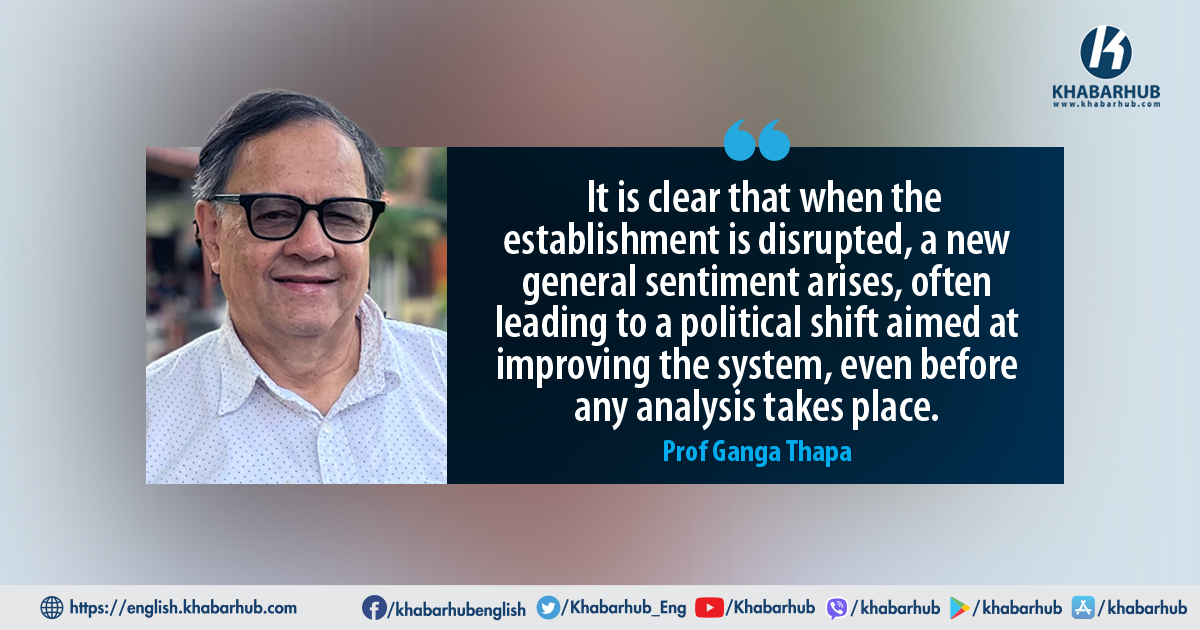I am uncertain about how democracy should be defined or understood, but many experts emphasize that its success relies on the ability to hold leaders accountable and ensure justice.
As a student of politics, I have come to understand that democracy is not a rigid ideal or symbol.
This has been demonstrated throughout the history of democracies, from ancient Greece and the Roman Empire to modern systems in Switzerland, the United States, Canada, the United Kingdom, India, Denmark, and beyond.
I contend that democracy should aim to create an egalitarian state where equal outcomes naturally emerge from individual choice in a free society.
This requires eliminating the privileges cherished by select communities, regardless of their qualifications.
In Nepal, tension arises from the deceptive actions of the current political class—those who fought for democracy but have failed to unify mutual interests.
Their responsibility should be to create autonomous, self-determining citizens with equal social and legal privileges, benefits, and protections.
If the previous thirty-five years are any indication, these five traitors rely on rampant hedonism and a darkly nihilistic outlook that drives their warped attempts to terrorize Nepali society.
Indeed, even in democracies, small factions often operate as an ‘imperium in imperio,’ a Latin expression meaning a power within a power, making independent decisions and exercising their authority within the broader system.
But in a genuine democracy, the rule of law prevails, requiring accountability from everyone, regardless of status or influence.
We cannot expect Nepali political leadership to follow what the German philosopher described as a ‘drop-down menu of moral rules,’ meaning that one should ask whether the principle guiding their actions could be applied consistently to everyone without contradiction.
This idea aligns with Jean-Paul Sartre’s view that ‘nothing can be good for us without being good for all’ (cited in Gairdner, The Great Divide, 2015).
It is true that individuals with free will can always think whatever they want about one another, and that cannot be controlled.
However, the Oli-led regime appears to be shifting towards a domestic oligarchy, concentrating power in the hands of a wealthy and tightly connected few.
It seems determined to use its authority to prolong Rabi Lamichhane’s jail time by filing numerous charges against him.
Since democracy is governed by the rule of law, all individuals must be held responsible for their actions.
In that sense, if the law mandates that Rabi Lamichhane serve a life sentence or face execution, there should be no hesitation in enforcing it.
Any investigations must be based on measurable and quantifiable standards, and they should be conducted with honesty and care.
The rule of law is the cornerstone of democracy, but the problem is that we Nepalis are living under a falsely described version of parliamentary principles, with secrecy on one hand and conspiracy theories on the other.
To clarify, Nepal’s political structure is shaped by politicians, not demigods. But when will the notorious corrupt individuals and foreign agents, who have been looting state resources for the past thirty-five years, be held accountable?
Specifically, when will Oli, who abused his executive power by allegedly promising to clear Min Bahadur Gurung and his gang of their crimes after he seized billions in land for his party, face justice?
Likewise, when will the Deuba couple, particularly Arzoo Deuba—currently the foreign minister—who has been implicated in human trafficking through a scheme to convert Nepalis into Bhutanese refugees for resettlement in third countries while extorting millions, be held accountable?
How and when will both of them face justice? It is understandable that the Oli-Deuba duo seems to be proceeding with Rabi, who has been cowed into silence about exposing the flimsy rhetoric surrounding the crackdown on cooperative cheaters.
Yet, the key question now is: when and how will cooperative depositors get their money back? This is a genuine concern in the current situation.
Let’s consider what both sides have to say, even though the judiciary appears largely submissive to the executive, with most judges being appointed on the basis of party loyalty.
Additionally, we Nepalis now live in a morally compromised and dishonest society, and most surprisingly, we seem to have lost the basic moral courage to articulate and defend our personal views in public rationally.
However, the lingering question remains: how long will impudent, mendacious, braggart, and corrupt traitors like Khadga Oli, Sher Bahadur Deuba, Pushpa Kamal Dahal, Madhav Nepal, and Baburam Bhattarai continue to exploit their political power, manipulate the system, and evade justice through fiction and abstraction?
Given this track record, can we reasonably expect good governance from an administration formed under the patronage of Nepal’s most notorious corrupt couple—the Deuba couple, infamous for their history of corruption, along with their close associates?
Their corruption isn’t a case of conscience fleeing when the belly rumbles; it’s a deliberate effort to corrupt the political system for their own benefit.
If the previous thirty-five years are any indication, these five traitors rely on rampant hedonism and a darkly nihilistic outlook that drives their warped attempts to terrorize Nepali society.
This absurd fantasy fuels a troubling narrative that undermines the foundations of Nepal’s democracy, perpetuating a culture of impunity and corruption.
Nepal is a case where politicians act as propaganda machines, and many loyal party followers remain blind to the fact that their leaders, regardless of where they sit on the political spectrum, are increasingly ignoring the need for public consent or approval.
Those who might oppose them seem too paralyzed to react, highlighting a classic failure to dismantle ineffective leadership.
We often hear articulate Nepalis expressing the same sentiments, and now these individuals have the opportunity to step in and take charge.
In every life, there is a decisive event that shapes a person’s fate, convictions, and passions.
For these five evil-minded individuals, it is clear they are beastlike, unable to recognize their own guilt, clinging desperately to a false sense of righteousness. Without this delusion, madness would not be far behind.
Following the adoption of Nepal’s 2072 Constitution, Khadga Prasad Oli, despite receiving a historic public mandate, quickly deviated from democratic principles, steering the country toward authoritarianism and even undermining the Constitution.
Rather than working to establish a sustainable welfare state, his government descended into disorder.
This is up to us to sort out as democratic citizens. It is clear that when the establishment is disrupted, a new general sentiment arises, often leading to a political shift aimed at improving the system, even before any analysis takes place.
Given this track record, can we reasonably expect good governance from an administration formed under the patronage of Nepal’s most notorious corrupt couple—the Deuba couple, infamous for their history of corruption, along with their close associates?
My view is that expecting good governance from Oli is like lending meat to a dog.
It’s crucial to remember that democracy has always allowed for participatory politics, grounded in a long and powerful tradition.
Yet, in moments like these, we Nepalis are forced to confront a difficult truth: is the democracy we’ve built now in decline, or are our politicians truly capable—or bold enough—to govern effectively?
In this context, when considering the paths taken, one would hope that politicians who cling to outdated, almost 18th-century ideas have no place in the future.
Instead, the future should be shaped by a new generation of leaders.
It is too late to remove the corrupt politicians I mentioned from the Nepali political landscape.
While I’m not sure how this will happen, we, the people, must take a stand to ensure that the current political mandate does not continue until 2084.
This is up to us to sort out as democratic citizens. It is clear that when the establishment is disrupted, a new general sentiment arises, often leading to a political shift aimed at improving the system, even before any analysis takes place.









Comment